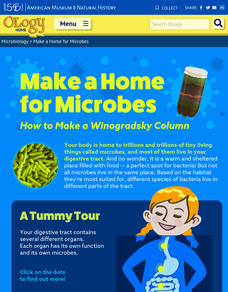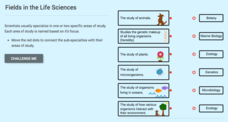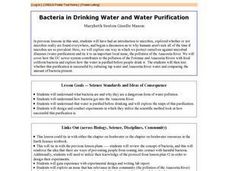Curated OER
The Science of Microbes
Looking for an interesting text to share the world of microbes with your middle school classroom? The edition contains explanations, worksheets, experiments, discussions, and links to outside sources for a true and complete...
American Museum of Natural History
What Do You Know About the Human Microbiome?
Scholars answer 10 multiple choice questions to test their knowledge about the human body and microbes. Correct answers come with a rewarding tone and brief description.
American Museum of Natural History
Microbes Coloring Book and Scavenger Hunt
Coloring pages showcase microbes—bacteria, viruses, and protists. Scholars have the option to download a coloring book and scavenger hunt or color the page directly on the computer. Three paragraphs describe each microbe.
American Museum of Natural History
Make a Home for Microbes
Make a Winogradsky Column to discover how microbes live within the digestive tract. First, participants take a tour of the stomach. Then, gather supplies and start building using a variety of materials. Over eight to 10 weeks,...
Learning Games Lab
Controlling Water Activity in Food
Food storage matters! Scholars learn how the amount of water in corn can affect its rate of spoilage. They create a control group, then test three corn samples stored in three different locations for water activity. As a result of the...
Learning Games Lab
How to Use Oil Immersion Microscope
Teach the class how to use a microscope to identify bacteria in food. Scholars explore the different parts of the microscope and learn how to determine total magnification. They walk step-by-step through the procedure of preparing slides...
Learning Games Lab
Testing and Adjusting pH
Pupils learn how to control food spoilage by adjusting the food's pH. They see that one of the most dangerous bacteria can grow in food if people don't handle and store food properly. Using knowledge of the bacteria's preferred pH,...
Learning Games Lab
Gram Staining
Scholars use a lab simulation to test contaminated yogurt for bacteria by gram staining. They learn proper lab procedures for handling bacteria and for sterilizing equipment, and then walk through the process on their own to try gram...
Learning Games Lab
Bacteria Sampling
Scholars explore the procedure for bacteria sampling in a virtual lab by first walking through a detailed step-by-step procedure of preparing the samples of raw milk and pasteurized milk, growing the bacteria, and comparing results....
College Board
AP Biology Practice Exam 2013
What is the best way to prepare for an AP® exam? Learners become familiar with the AP® Biology exam by completing a full-length practice exam. The AP® test prep by the College Board contains multiple choice, grid-in, and free-response...
Center for Technology in Teaching and Learning
MedMyst: Disease Defenders
The news often refers to a team of experts handling situations and outbreaks of illnesses. Young scientists learn about such a team as they train to prevent infectious disease outbreaks Scholars meet three experts, learn about...
Nuffield Foundation
Working with Immobilized Enzymes or Microscopic Organisms
Let the lab be a catalyst to learn about enzymes. Scholars create alginate beads filled with yeast. As part of an investigation into enzymes, they see how these beads provide a catalyst to the reaction of glucose into ethanol.
Nuffield Foundation
Making Up Nutrient Agars
A resource rich in information—and nutrients. Learners create agars for the purpose of cell cultivation in Petri dishes. The lesson provides instructions on how to create agars for the cultivation of different microorganisms.
CK-12 Foundation
Fields in the Life Sciences
Many fields of study require a specialty and a sub-specialty as you progress through your education. Scholars learn about six sub-specialties of life science. From botany to zoology, our knowledge of the world of living organisms expands...
Curated OER
Viewing Bacteria
Have you ever wanted to know the true structure of E.coli? Does the thought of peering into its "small world" sound exciting? Here is a lesson plan that allows pupils the ability to do just that. Blossoming microbiologists use...
Teacher Web
Archaebacteria and Eubacteria
Take young biologists back to the beginning of life on Earth with this presentation on bacteria. Examining the different classifications of bacteria, this presentation introduces young scientists to the concepts of autotrophs and...
Baylor College
Post-Assessment: And Now, What Do You Know About Microbes?
Your life science class works in their groups to review the concept maps that they have constructed over the course of a microbiology unit. They share what they have learned with the rest of the class. In a second session, they are given...
Baylor College
Milestones in Microbiology
Life science learners read a set of six short Discovery Readings that describe historical events in the field of microbiology. For each, they identify clues about when the event occurred and then they try to arrange events in...
Curated OER
Arctica - An Interactive Mystery
Rumours of illness, poisoning, and madness - a ship disappears without a trace! Read this interactive science story and use deductive reasoning skills to solve a mystery. This engaging resource gives science stars a chance to practice...
Curated OER
Microbiology Lab Safety
In this biology worksheet, learners are introduced to the practices of safety as related to using a laboratory and then answer some questions as an assessment.
Curated OER
Bacteria in Drinking Water And Water Purification
Students explore how sewer systems can contribute to water pollution and perform an experiment to see how well a water purification technique can protect against water-born microbial illnesses. They compare the bacterial growth from...
Curated OER
Identification of Gram Negative Bacilli—Oxidase
In this biology worksheet, students identify the different types of reagents being used with the samples as part of an extensive lab experiment.
Curated OER
Size and Shape
Students observe different substances under the microscope. For this space science lesson, students identify the different features of SEM images. They formulate a conclusion about the images of Mars meteorites.
Curated OER
What is Microbiology?
Students research microbiologists. In this research instructional activity, students will research a microbiologist, create timeline sections, and build a timeline. Students will also use a website to research a particular...

























